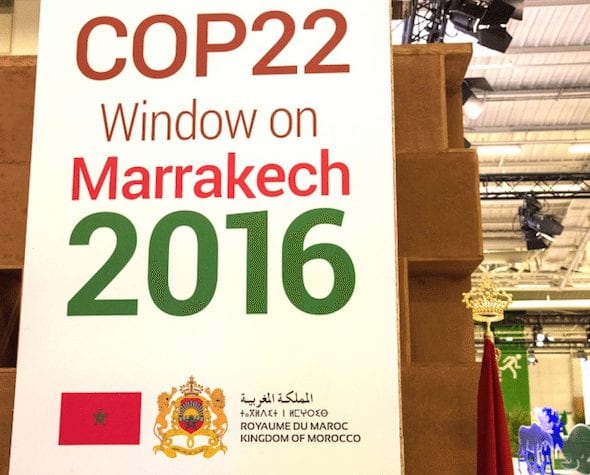I woke this morning to a call to early prayers and to news of the tabling of Parliament’s treaties committee (Joint Standing Committee on Treaties) report recommending ratification of the Paris agreement.
It was a solid review of submissions and DFAT’s National Interest Assessment as well as the very broad spread of support for ratification from the BCA to the Climate and Health Alliance.

The report noted, but swiftly dealt with, the submission of Senator Roberts and two others opposing ratification. The path is now clear for either Minister Bishop or Frydenberg to formally ratify next week or for this to be done by the Ambassador for the Environment before that. As of today there are now 100 countries representing 69 per cent of global emissions that have ratified.
Day one at Marrakech kicked off with festivities to mark the Paris agreement becoming international law at least a couple of years quicker than most expected. After a gruelling few decades of negotiations there were reasons to pause for a moment at least to celebrate.
As the festivities ebbed it was down to business to work on the detail of the accountability and ratchet mechanisms (see our paper on our COP22 web page for more detail) and hopefully set a deadline of 2018 to have all the processes established. 2018 is an important year as it will play host to a stocktake of cumulative national efforts against the commitments agreed at Paris – and a “facilitative dialogue” thereon. There will be continued efforts for countries to lift their pre-2020, as well as post 2020, ambition. At the end of last week another independent assessment highlighted that there was a large shortfall between the commitments at Paris to limit warming to 1.5-2C and the pre-Paris indicative commitments such as Australia’s 2030 target.
Elsewhere, China released a conservative plan for the power sector under the 13th five year plan, and after a few twists, and turns Philippine’s President Duterte instructed his Senate to get on with ratification process. The Chinese plan and the targets in it are not binding, but seems to reflect the difficult political bargain between the central government, local provinces, and interest groups.
Given China’s coal consumption decline, these announcements reflect a disconnect between the real-economy and policy. Over the last three years China has seen coal consumption peak and record wind and solar installations. While the new plan consolidates many of these accomplishments, it does little to increase ambition – recent years saw repeated escalations in renewable power estimates so this appears very much a baseline.
The possibility of “he who shall not be named” getting elected as President does loom large over the negotiations but the afternoon was described as workmanlike as the diplomats got on with business. Not much to be done about that from here!
John Connor is the CEO of The Climate Institute, www.climateinstitute.org.au








